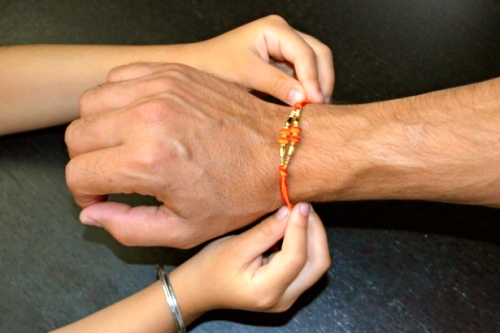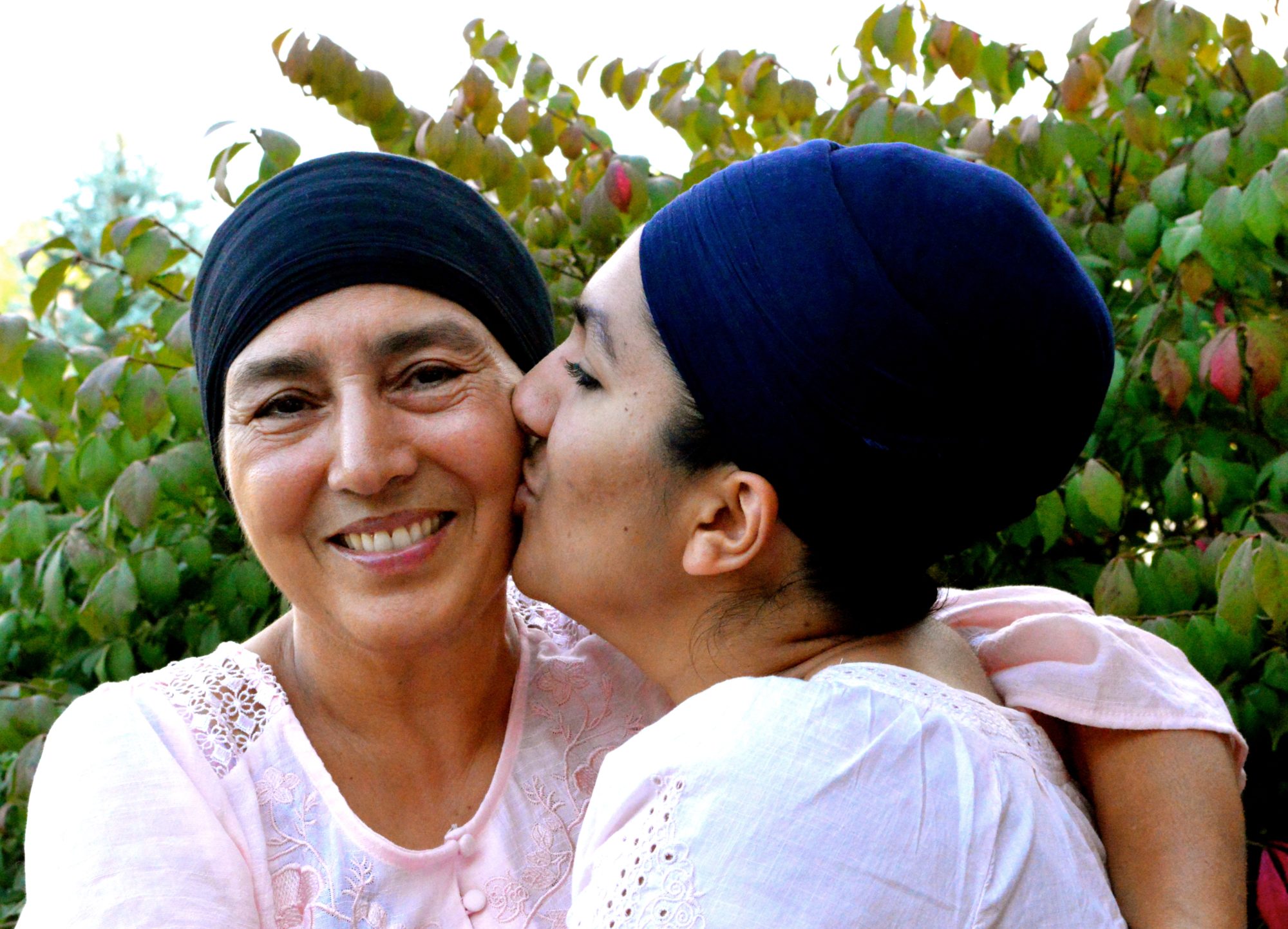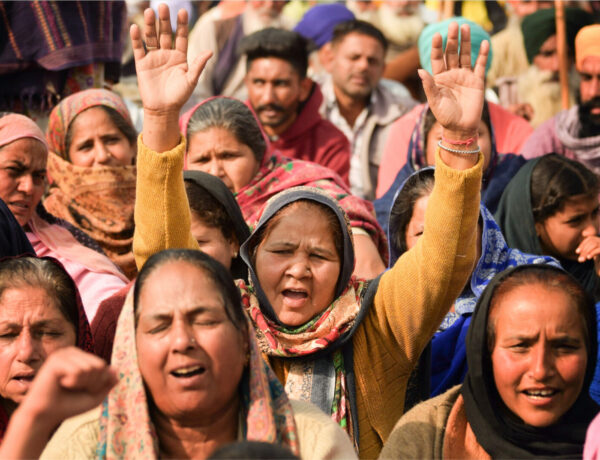By Anymous Kaur
Though the word feminism* has become mainstream, people of all genders fall prey to an insidious spinoff of women’s oppression: diet culture. Diet culture tells femmes a body is more valuable if it takes up as little space as possible. Males feel pressure to bulk up and reduce the amount of fat tissue. The struggle for thinness was born of colonial beauty standards that hold thin, able, white bodies as the most beautiful and therefore most worthy of respect.
In much the same way that skin color has been used to create hierarchy, body obsession and consumerist wellness culture have created an endless struggle for millions of people in a multi-billion dollar industry.
Because of times in my childhood when there was not enough food available to me to meet my basic needs, I grew up food insecure: always afraid of not having enough. This helped me to embrace the clean-your-plate mentality in the Punjabi Sikh community when I converted years ago.
Because of pressures to be thin in my family of origin and work life, I used restrictive behaviors to control my body shape. This deprived me both of vital nutrients and of a trust in myself that I was worthy of feeding and capable of doing so. I was anxious all the time: not exactly the paragon of calm contentment that is promised by Gurbani to sevadars of Guru Sahib.
(For the science behind why diets don’t work, go to http://Lindabacon.org)
Through Sikhi I gradually sensed the courage I needed to reach out for help with my obsession which was taking a toll on my health in some noticeable ways. I worked with a dietician and joined groups centered on body respect. I learned that fat phobia and the myth of thin supremacy cause of stress-related illness, but that being in a large body itself does not. In other words, being fat in and of itself isn’t a hazard, but living in a society that rejects fat people is.
During my recovery, my body got larger and did not fit into my formerly favorite suits and chola. I was shy to go to Gurudwara: I was afraid of aunties scolding me for my kurti riding up my backside, of my sisters commenting about my weight. I was nervous to get fitted for more suits. I did not want to be called fat by a tailor.
In early days, when I was weight-suppressed and harming myself to control my body shape, pizza sevadars happily piled slices onto my plate. But now in my larger body I was given only one slice, followed by complete absence of eye contact. I did not want to endure this policing of my plate.
I did not give up.
A shabad from our dear Guru Tegh Bahadur Ji on Ang 1186 helped me immensely along the way: “Sadhu, know this: the body where Ram dwells is unmistakably true. Praise and slander are both alike: earn the wealth of Har’s name.”
As well as another, from Salok Mehal Nauvan, Guru Tegh Bahadur Ji, ang 1427, “Nanak says, listen oh mind, this one is truly a wise soul: They who are afraid of no one and cause no one else to be afraid.”
ਹਰਖੁ ਸੋਗੁ ਜਾ ਕੈ ਨਹੀ ਬੈਰੀ ਮੀਤ ਸਮਾਨਿ ॥
Harakẖ sog jā kai nahī bairī mīṯ samān.
One who is not affected by pleasure or pain, who looks upon friend and enemy alike
ਕਹੁ ਨਾਨਕ ਸੁਨਿ ਰੇ ਮਨਾ ਮੁਕਤਿ ਤਾਹਿ ਤੈ ਜਾਨਿ ॥੧੫॥
Kaho Nānak sun re manā mukaṯ ṯāhi ṯai jān. ||15||
says Nanak, listen, mind: know that such a person is liberated. ||15||
ਭੈ ਕਾਹੂ ਕਉ ਦੇਤ ਨਹਿ ਨਹਿ ਭੈ ਮਾਨਤ ਆਨ ॥
Bẖai kāhū kao ḏeṯ nėh nėh bẖai mānaṯ ān.
One who does not frighten anyone, and who is not afraid of anyone else –
ਕਹੁ ਨਾਨਕ ਸੁਨਿ ਰੇ ਮਨਾ ਗਿਆਨੀ ਤਾਹਿ ਬਖਾਨਿ ॥੧੬॥
Kaho Nānak sun re manā giānī ṯāhi bakẖān. ||16||
says Nanak, listen, mind: call them spiritually wise. ||16||
In my feminist community online, I learned how connected the thin ideal is to colonial oppression and the notion of white supremacy. I read up on our country’s terrifying history of slavery and Jim Crow violence and realized that I am far from alone. I learned from Gloria Lucas and author Michael Twitty of dieting’s connection to colonialists’ and slaveowners’ rejection of certain foods as categorically “impure” simply because of their association with people of color.
This harkens to precious Guru Nanak Sahib’s words in Asa ki Vaar, Ang 472.
ਮਃ ੧ ॥ Mėhlā 1. First Mehl:
ਸਭੋ ਸੂਤਕੁ ਭਰਮੁ ਹੈ ਦੂਜੈ ਲਗੈ ਜਾਇ ॥
Sabẖo sūṯak bẖaram hai ḏūjai lagai jāe.
Impurity is born of doubtful attachment to duality.
ਜੰਮਣੁ ਮਰਣਾ ਹੁਕਮੁ ਹੈ ਭਾਣੈ ਆਵੈ ਜਾਇ ॥
Jamaṇ marṇā hukam hai bẖāṇai āvai jāe.
Birth and death are ordained, by Their will we come and go.
ਖਾਣਾ ਪੀਣਾ ਪਵਿਤ੍ਰੁ ਹੈ ਦਿਤੋਨੁ ਰਿਜਕੁ ਸੰਬਾਹਿ ॥
Kẖāṇā pīṇā paviṯar hai ḏiṯon rijak sambāhi.
Eating and drinking are pure: the Merciful Divine of Worlds gives nourishment to all
ਨਾਨਕ ਜਿਨ੍ਹ੍ਹੀ ਗੁਰਮੁਖਿ ਬੁਝਿਆ ਤਿਨ੍ਹ੍ਹਾ ਸੂਤਕੁ ਨਾਹਿ ॥੩॥
Nānak jinĥī gurmukẖ bujẖi ā ṯinĥā sūṯak nāhi. ||3||
Nanak, in the ones who seek the understand Them, there can be no impurity.
Once I rejected willful and perfectionistic control of my body size, I began to claim my body’s shape as a gift from Waheguru. My unapologetic embodiment brought me closer to other women—including other Kaurs.
For months I avoided parshad seva: it felt unfair to me that women are the only ones who do it in most Langar kitchens I have seen. Paradoxically, my avoidance of this gendered seva isolated me from other Kaurs. Disconnection from my sisters is a tragic pattern in patriarchy that I certainly did not need on my quest for feminist liberation, or even body autonomy.
Eventually I found my way back to the steel kitchen table. I started my shift rolling perdé, as I have very little game with a rolling pin. With fond recognition, another kaur greeted me, “Sat Sri Akaal, moti!”
I continued making perdé. I understood that she had just called me fatty. I second guessed this. Then I replayed it in my mind’s ear.
But then, I smiled.
Mrs. Kaur had seen me. She had described my body which was bigger than it had been the last time she saw it; there was no negative connotation or judgement they way she used the word “moti”. In her voice was cheer at seeing me after so long. Personal banter seemed a currency of relationships for may people in sangat. This Kaur had invited me into her circle of familiar teasing.
It felt a welcome relief. Someone had called me fat, but I did not dislike it. Now that I knew the parallels of obsession to control my body size with colonial oppression, I was proud not to broadcast that affiliation. I was happy to be myself, dwelling in a body that had brought me to the table full of Kaurs who shared freely their strength and skill, all while singing Gurbani in sincere, strong tones. And there was plenty of room for me.
My morning at the kitchen table gave me courage to order new cholé online from a tailor in India. They asked me after seeing my measurements if I am “healthy”. I had no idea what that meant at first. I thought, “Is he worried that I have a degenerative condition and my size will change soon?” Nope. He was also calling me fat. But what a nice way of saying that! Yes, thank you, now that I am eating food and taking care of myself I do feel much healthier. And I have much more energy for Kirat, Simran and Sangat—not to mention for my career and feminist friendships.
Vaheguru Ji Ka Khalsa, Vaheguru Ji Ki Fateh!
*Bell Hooks, feminist author and activist, defines feminism as: a movement to end sexism, sexist exploitation, and oppression. Feminist politics aims to challenge and change patriarchy.
Resources
National HelpLines
You can always use a confidential browser like DuckDuckGo or Firefox Focus if you are not ready for others to find out about your search.
Confidential National Eating Disorders Association Helpline (U.S.): 1-800-931-2237
http://nationaleatingdisorders.org
Eating Disorder Hope (Can) 1-888-274-7732
http://eatingdisorderhope.com
Beat Eating Disorders (U.K.): 0808 801 0677
http://BeatEatingDisorders.uk.org
The Butterfly Foundation (Aus): 1800334673
http://thebutterflyfoundation.org.au
Eating Disorder Info for New Zealand
http://ed.org.nz
Podcasts
Food Psych
http://christyharrison.com/foodpsych
Fearless Rebelle Radio
http://summerinnanen.com/frr
Professional Organizations
Association for Size Diversity and Health
http://sizediversityandhealth.org
Beauty Redefined
http://beautyredefined.org





No Comments